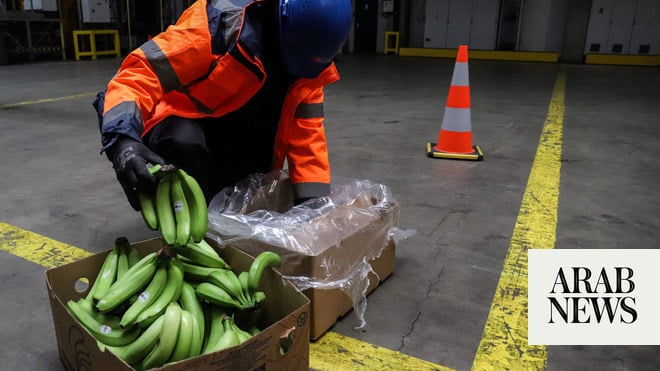
At 5am on a chilly Tuesday morning last month, 1,600 police officers and balaclava-wearing special forces, bristling with arms and battering rams, were ordered into action around the Belgian port city of Antwerp.
More than 200 addresses were raided in what was the largest police operation ever conducted in the country and potentially one of the most significant moves yet against the increasingly powerful narco-gangs of western Europe.
There are hopes that Operation Sky will herald the downfall of a generation of local bosses, although the Belgian and Dutch “godfathers” largely now hide out in Dubai and Turkey, hoping to be out of reach of the authorities.
An incredible 27 tonnes of cocaine have been seized on Antwerp’s quays, in container ships and safe houses, with an estimated value of €1.4bn (£1.2bn), and many arrests have been made. It has been hailed as a mighty blow against what Belgian federal prosecutor Frédéric Van Leeuw calls “a world where morality has totally disappeared”, but Operation Sky has also highlighted a chilling development. Europe has eclipsed the US as the Colombian cartels’ favoured market, because of higher prices and much lower risks posed by European governments in terms of interdiction, extradition and seizure of assets.
Jeremy McDermott, a former British army officer who is now executive director of the thinktank InSight Crime, said a kilogram of cocaine in the US is worth up to $28,000 wholesale but that rises to $40,000 on average in Europe, and nearly $80,000 in some parts of Europe.
“It is more money for less risk. I see a deliberate decision by some of the top-level Colombian traffickers, based on sources who sat in a series of meetings in 2005-6, where the business decisions were made,” McDermott said. “It is a business no-brainer. The reason Antwerp and Rotterdam are so attractive is because they are some of the most efficient ports in the world, handling enormous volumes of containers, which allows traffickers to play the numbers game.”
The methods of operation being brought to Europe’s major ports, where Dutch and Belgian criminals are sub-contracted by Colombians to move the product onwards to Italian, Albanian, British and Irish organised crime networks, are bringing a level of corruption and violence never before seen in this part of the world. “We don’t have robberies any more,” said Joris van der Aa, the Gazet van Antwerpen newspaper’s respected crime reporter and columnist. “Everyone is working in the drug business.”
Among those dragged from their beds on the first Operation Sky raid on 9 March were serving police officers, an employee of the public prosectors office, civil servants, tax officials and hospital administrators suspected of feeding desired information to the gangs, as well as those thought to have been responsible for almost daily incidents of gang-related violence in the city in recent months, ranging from drive-by shootings and grenade attacks on homes to punishment beatings. Nearly 50 arrests were made but many more have followed. Only last Thursday, two prisons and 24 homes were searched in Antwerp, Borgerhout, Borsbeek, Essen, Lokeren, Wilrijk and Wijnegem. A further 11 people were read their rights.
Operation Sky had been two years in the making, triggered, in part, by an escalating sense of fear in the city. The mayor of Antwerp, Bart De Wever, has a 24-hour security brief following threats to his life. But the scale of the savagery that has befallen Antwerp was perhaps most acutely felt last summer with the discovery of a torture chamber in the village of Wouwse Plantage, 30 miles outside the city.
A makeshift prison had been found constructed out of seven shipping containers, six of which were used as holding cells. The final one, complete with dentist’s chair with straps on the armrests and footrests, was fitted out for torture. Shears, saws, scalpels, pliers, tape, balaclavas and black cotton bags to be put over the head provided graphic enough evidence of the scenes that had unfolded.
But for all the calls made by De Wever for a “high-pressure hose” to be put on this stain on the city, Operation Sky was, according to Belgian prosecutors, only possible due to the deciphering of what had been described as an uncrackable encrypted messaging service known as SKY ECC, a Canadian communications company suspected by the prosecutors to be a criminal organisation masquerading as a legitimate business catering for privacy-loving people.
Prosecutors said smartphones fitted with the SKY ECC app, but with microphone and GPS functions removed, had been distributed throughout the city to those within the network of people suspected to be working for the narco-gangs.
Worldwide, there are 171,000 SKY ECC devices registered, mainly in Europe, north America, a number of countries in central and south America – mainly Colombia – and in the Middle East. But, strikingly, 25% of the active users of these devices are located in Belgium (6,000) and the Netherlands (12,000), and half of those were said to be in use in around Antwerp port.
In “cracking” SKY ECC, the Belgian police claimed they had broken into a communications network used and so wholly trusted by the drug traffickers, and those they blackmailed, threatened and bribed, that images of torture and execution orders were freely sent around, along with insider financial and operational information.
For a period of three weeks, officers were able to view messages live as they were sent, collecting information, acting only where they feared there was a risk to life, and building an unprecedented picture of the increasingly powerful and vicious criminal networks working out of the ports of Antwerp and Rotterdam.
SKY ECC has reportedly denied police had compromised their encrypted messaging platform, saying instead that a malicious phishing app, illegally distributed under the SKY ECC name, was what the police appeared to have hacked.
“The pictures are worse than what I have seen in some TV series,” Van Leeuw told reporters of the images he had seen on the service. “Settling of scores, contract killings, photos of victims, messages that say if we don’t find a target, we attack the family. It’s absolutely incredible violence.”
Belgian prosecutors said investigators intercepted about 1 billion encrypted messages from SKY ECC in total, of which almost half have been decrypted, but which will take months to work through, likely raising many new avenues of inquiry.
Jean-François Eap, SKY ECC’s global’s chief executive officer, and Thomas Herdman, a former distributor of Sky Global devices, were charged in the US on 12 March with a conspiracy to violate the federal Racketeer Influenced and Corrupt Organizations Act (Rico). Both have denied wrongdoing. Eap has said “the unfounded allegations of involvement in criminal activity by me and our company are entirely false”.
The prosecutor’s office is realistic about the impact on the criminal underworld of Operation Sky. “We are aware the criminals will be flexible and will search and find new ways to communicate,” a spokesman said. “We will have to be alert to follow these new technologies”. But Van der Aa, who has been following the repercussions at street level, believes Operation Sky will be a watershed moment – whether for good or bad.
“It is a big blow because, in Belgium and a great part of the criminal underworld in the Netherlands, they really trusted Sky as a system,” he said. “They were so full of confidence, and the police now have so much information on how the underworld was structured, bank accounts, all the corrupt contacts are being arrested. It takes years to build these networks.
“I think there will be a change of a whole generation of criminals. Twenty seven tonnes of cocaine is a lot to lose. In south America they will be thinking, ‘Let’s not do business with these Dutch and Belgian guys any more’.
“So, it is just very quiet at the moment. Everyone is waiting for the storm and asking themselves what the police know. Eventually, they will go after the guys in Dubai.
“But the question then is, who will replace them?”












